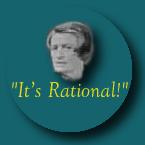zorn said:
I think philosophy-for-14-year-olds is a perfect description of "Objectivism." Rand's books read like adolescence spilled into novel form: everything out of proportion, self-important, melodramatic, alienated, with insecurity masquerading as condescension.
Calling Rand herself a "philosopher" is more than a bit of a stretch IMO, akin to calling Britney Spears a "musician" or an "artist." She might be popular with some people, she might be catchy in short doses, but what she does bears only a vague relation to what actual musicians -- like say the awesome Neutral Milk Hotel  -- do.
-- do.
:D
That sounds like something Dominique from the Fountainhead would say! Only, substitute the name Roark for Neutral Milik Hotel and Peter Keating for Brittany Spears. How interesting...

(and i applaud your musical taste btw

)
I do agree with you Zorn that everything in the book is "out of proportion, self-important, melodramatic, alienated." And I also agree, if her characters were people in real life, they would be "masquerading insecurity as condescension." However, I think the characters deliberately are not 3-dimensional. Instead they're symbols of an extreme example of one "thing" - whether it be Peter Keating representing the "rabble" aspects of mankind, Roark representing the Will to Power in man and so on. As such, the melodrama, and out of proportioness is an apropriate, if sometimes annoying stylistic choice.
However, I have found something in her philosophy and explanation of The Fountainhead that irks me greatly. It's her "reason" worship. For instance, despite her great and obvious borrowing from Nietzche, she dismisses him as a "mystic and irrationalist" and criticises him saying "his espistemology "subordinates reason to 'will'". She explains that Roark's impenetrable "will" is simply the effect of his great reasoning skills, and his knowledge that he has reasoned correctly. She also tries to pawn the "love" between her and Roark, as the effect of pure reason, because it is only reasonable, when thinking about it, that they should be together.
This is nonsense though. Roark in fact, acts very unreasonable throughout the entire novel. He refuses to compromise his work, even in the slightest way. At one point, he gives up a commission that would have kept him in business for a long time, simply because the people he's building it for wanted a classic motive on its facade. When the people offering him the commission accuse him of being irrational he even replies, "probably." Because of this he closes his office and goes to work at a granite quarry as a simple laborer. Whats driving him? Surely not reason. If that were the case he would have taken the job and compromised. It is an irrational force driving him, and that irrational force in many ways resembles Nietzche's concept of Will to Power.
Same goes with Roark's relationship with Dominique. Using one's reason solely, it makes sense that Dominique would marry the heir to her father's business, the handsome, successful Peter Keating. However, as absurd as it seems, given the outside circumstances, Roark and Dominique are in love and at the end are together. At one point, Dominique's need to see Roark is described as "too great to have a purpose." Also, the intensity of their sexual encounters are more akin to an irrational passion, than to the dry reason of the mind. Again, its libido or eros as a drive, or perhaps a better word to use would be "daimon," not as the effect of reason.
By the way Zorn, I'm not trying to argue with you just to be disagreeable. Your dissenting quotes just make a good way for me to clarify my thoughts on the paper i'm writing.






